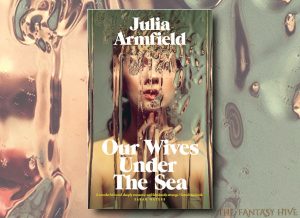OUR WIVES UNDER THE SEA by Julia Armfield (BOOK REVIEW)
“The deep sea is a haunted house: a place in which things that ought not to exist move about in the darkness.”
Julia Armfield’s debut novel Our Wives Under The Sea (2022) is a gorgeous gothic masterpiece. The novel tells the story of a woman’s wife who has come back from the sea mysteriously changed. Beautifully written, Armfield’s novel expertly interweaves fairy-tale and horror motifs with a moving and intimate portrayal of loss. Our Wives Under The Sea is wonderfully uncanny, drawing on all our fears of the unknown horrors lurking at the bottom of the ocean and visceral body horror, but also on our more mundane fears about the loneliness of the human condition, whether or not we can ever truly know even the people we love. Armfield brings the scares and expertly ratchets up the tension, but at the heart of the novel is the relationship between Miri and Leah, their love for each other and how it perseveres under incredible strain. Our Wives Under The Sea is as lyrical and moving as it is frightening and discomforting, and its human core makes its exploration of the Weird all the more powerful.
 Miri’s wife Leah has been missing for six months, after a deep sea mission goes wrong. When Leah suddenly reappears, Miri is relieved and overjoyed. But it soon becomes clear to her that the Leah who has returned is not the same as the Leah who left. She is bleeding from her skin, barely eating anything, spending all her time submerged in the bathtub. What’s worse, the special spark, the secret rapport that Leah and Miri shared, has somehow gone, and Miri feels she is living with a complete stranger, not the woman she decided to spend the rest of her life with. As Leah’s condition grows worse, Miri must deal with the grief of losing the person she loved all over again.
Miri’s wife Leah has been missing for six months, after a deep sea mission goes wrong. When Leah suddenly reappears, Miri is relieved and overjoyed. But it soon becomes clear to her that the Leah who has returned is not the same as the Leah who left. She is bleeding from her skin, barely eating anything, spending all her time submerged in the bathtub. What’s worse, the special spark, the secret rapport that Leah and Miri shared, has somehow gone, and Miri feels she is living with a complete stranger, not the woman she decided to spend the rest of her life with. As Leah’s condition grows worse, Miri must deal with the grief of losing the person she loved all over again.
Our Wives Under The Sea is told in two strands, one from the perspective of Miri after Leah has returned from the ocean, and one from the perspective of Leah as she describes the ill-fated ocean exploration mission that went so horribly wrong. This dual perspective allows us to see Miri and Leah’s relationship from both sides, accentuating the tragedy. Both women clearly love each other deeply. Leah’s love for Miri and her need to see her again sustain her through the horrors she is exposed to stranded on the ocean floor, and what makes Leah’s reappearance in Miri’s life so difficult is the fact that Leah completed her life so fully. Miri thought that she had lost that for good, only to have it returned, and now she is understanding that the life the two of them had together is truly over, she is going through the grief of losing a central part of her life twice. The entwined storylines are displaced in time but also in structure – Leah’s confessions about her ordeals under the sea are not directed at Miri, who must try to navigate what’s happening to the woman she loves whilst being more in the dark about what’s happened than the reader.
The novel draws on the fairy-tale motif of the changeling. The Leah who has returned to Miri is not the same as the Leah who has left – has she been replaced by a creature from the depths, or simply transfigured by her experiences? Leah’s chapters detailing her story contrast with the Leah we see through Miri’s eyes who is increasingly withdrawing from humanity, both physically and mentally. Armfield engages in some truly delectable body horror, as Leah’s human form starts to collapse and she transforms into something thoroughly inhuman. This is echoed by the abyssal horrors that Leah faces in the submarine. The image of a submarine losing power and sinking to the bottom of the ocean, unable to be rescued due to the intense pressures it was specially designed to explore, with three people trapped in it, is intense enough by itself. Soon the occupants start experiencing strange phenomena, frightening noises, whispered words outside the ship. The ocean floor they were sent to explore should be teaming with bizarre deep aquatic life, but is strangely dark and barren. As the tensions between the three researchers rise, they each begin to lose their grip on reality, suffering hallucinations and time loss. Leah even begins to suspect that perhaps this was part of the mission plan all along. The characters’ decent into the depths is paralleled by their decent into madness. But madness alone cannot explain what’s happening to the Leah who has made it back home.
Meanwhile, Leah’s story in the past is contrasted with Miri’s story in the present. Ironically enough, one of the effects of grief is this unmooring of time – Miri spends much of her days reflecting on her and Leah’s shared past, their shared history that makes up the fabric of their relationship. It also causes her to remember her grief over her mother’s decline into dementia. Miri’s mother was a difficult woman who had a troubled relationship with her queer daughter, but Miri still feels the grief over her loss. Her mother’s slow decline and death due to Alzheimer’s also echoes the difficult period of extended mourning that Miri is going through over Leah. She has already had to adjust to the difficulty of Leah disappearing on a mission, a kind of loss that comes without the closure of death as she is always left wondering if she might still be out there somewhere. Now she undergoes a similar process as Leah becomes more and more unlike the person she knew, physically and mentally declining. Armfield expertly explores the isolating nature of grief, in how it gradually swallows up Miri’s entire life, making it so that she can’t concentrate on her work and is unwilling to reach out to her friends or accept their help when they reach out. The novel beautifully captures the intense loneliness of grief, of how personal a devastation losing the person closest to you is.
Our Wives Under The Sea is haunting in both senses, by uncanny presences and by the enormity of grief. It is an intensely moving read, with a lyricism that makes even its most uncomfortable and disturbing moments deeply compelling. Armfield has written a modern classic in the genre of the gothic fairy-tale, and a deeply thoughtful and affecting work of horror fiction. Our Wives Under The Sea is worth submerging yourself in, but be warned you may return different from when you went in.

